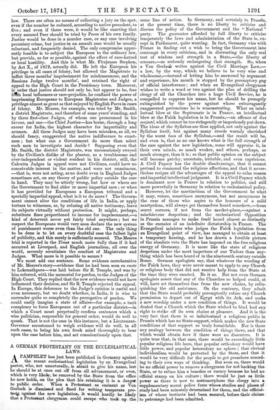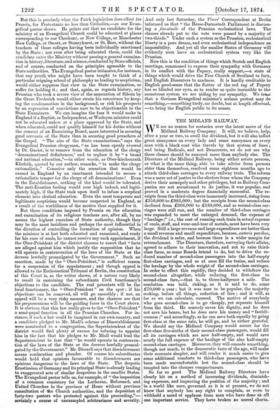A GERMAN PROTESTANT ON THE ECCLESIASTICAL LAWS.
APAMPHLET has just been published in Germany against the recent ecclesiastical legislation by an Evangelical pastor, who, not unnaturally, is afraid to give his name, lest he should be at once cut off from all advancement, or even, which is very likely, be removed by the State from. the office he now holds, on the plea that his retaining it is a &riga. to public order. When a Protestant as eminent as Von Gerlach is dismissed and fined for writing temperate pro- tests. against the new legislation, it would hardly be likely
that a Protestant clergyman could escape who took up the , to patronage had been admitted.
same line of action. In Germany, and certainly in Prussia, at the present time, there is no liberty to criticise and discuss the policy of the Government and the " National " party. The guarantee afforded by full liberty to criticise temperately the laws and administration of the State is, ex- cept in Parliament, quite wanting. In fact, Germany vies with France in finding out a wish to bring the Government into contempt in every criticism, and in distrusting the only real test of wisdom and strength in a State,—the liberty of censure,—as seriously endangering that strength. So, when a Von Gerlach writes against the Civil Marriage Law,— a law, by the way, which we believe to be very wise and wholesome,—instead of letting him be answered by argument and experience, his mouth is stopped by the peremptory gag of official interference ; and when an Evangelical clergyman wishes to write a word or two against the plan of drilling the clergy of all the Churches into a huge Civil Service, he is compelled to suppress his name, lest he should be promptly extinguished by the power against whose extravagantly exaggerated pretensions he is remonstrating. What an intel- lectual blow at the Septennate is in France, an intellectual blow at the Feick legislation is in Prussia,—an offence of laze majeste, which cannot be too stringently or imperiously put down. The ideas of the Syllabus are thud applied, not only against the Syllabus itself, but against many creeds warmly cherished by the worst foes of the Syllabus,—and the result will be, and even is, that as no one knows what is the full strength of the case against the new legislation, some will appraise it, in their own minds, as much weaker, and others, perhaps, as much stronger, than it is ; so that public opinion on the subject will become patchy, uncertain, irritable, and even capricious. A Civil Papacy has the double disadvantage, that it cannot pretend to command the religious affections, and that it never- theless resigns all the advantages of the appeal to calm reason and impartial intellectual judgment. It is a Civil Papacy which is dominant now in France in relation to politics, and still more powerfully in Germany in relation to ecclesiastical policy. However, let the martinetism of the Government be what it may, voices, sometimes anonymous, but not anonymous in the case of those who aspire to the honours of a mild martyrdom, will always get themselves heard somehow,—from secret corners, if not from the market-place,—against a mischievous despotism ; and the ecclesiastical Opposition in Prussia manages to make itself heard almost as distinctly as the enemies of an indefinite dictatorship in France. The Evangelical minister who judges the Feick legislation from an Evangelical point of view, has managed to obtain at least a temporary hearing, and he has drawn a forcible picture of the absolute veto the State has imposed on the free religious energy. of Germany. It is more like the state of religious despotism under the most imperious of our Tudors than any- thing which has been heard of in the nineteenth century outside Rome. German apologists say, that whatever the wording of the Feick laws, they were never meant to apply to any Church or religious body that did not receive help from the State at the time they were enacted. Be it so. But not even German apologists assert that any of the Churches so helped could, at will, have set themselves free from the new chains, by relin- quishing the old assistance. On the contrary, they admit that the State would probably peremptorily refuse any Church permission to depart out of Egypt with its Ark, and make a new worship under a new condition of things. It would be denied that a Church which the State wished to bind had any right to strike off its own chains at pleasure. And it is the very fact that there is so infinitesimal a religious public in Prussia which has no State-support, which makes the new State conditions of that support so truly formidable. Nor is there any analogy between the condition of things there, and that which would obtain here if there were no dissenters. It is quite true that, in that case, there would be exceedingly little popular religious life here, that popular orthodoxy would have little power, and popular heterodoxy no sphere ; that clerical individualism would be protected by the State, and that it would be very difficult for the people to get preachers accord- ing to their own ways of thinking. But even so, there would be no official power to remove a clergyman for not backing the State, or to refuse him a benefice or curacy because he had no official stamp on his culture ; there would be just as little power as there is now to metamorphose the clergy into a supplementary moral police force whose studies and places of study had been minutely determined for them, and the official- ism of whose instincts had been secured, before their claims
But this is precisely what the Falck legislation does effect for Prussia, for Protestants no less than Catholics,—as our Evan- gelical pastor shows. He points out that no candidate for the ministry of an Evangelical Church could be educated at places corresponding to our Cheshunt, or New College, or Manchester New College, or Oscott, or Stoneyhurst, or St. Bees, without the teachers of those colleges having been individually sanctioned by the State ; nor even after being educated there, could the candidate enter the Ministry without passing a general examina- tion in history, literature, and science, conducted by State officials, and of course, conducted on the principles agreeable to the State authorities. The Evangelical pastor intimates, for instance, that any youth who might have been taught to think of a particular reigning school of philosophy as leading to scepticism, would either suppress that view in the State examination, or suffer for holding it ; and that, again, as regards history, any Prussian who took a severe view of the annexation of Silesia by the Great Frederick would either strain his conscience by keep- ing the condemnation in the background, or risk his prospects by an expression of convictions sure to be objectionable to the State Examiners. We can imagine the fuss it would make in England if a Baptist, or Independent, or Wesleyan minister could not be educated unless at a place approved by the State, and when educated, could not qualify himself for his duties without the consent of an Examining Board, more interested in securing good servants of the State than in securing good preachers of the Gospel. " The aim of the State examinations," says the Evangelical Prussian clergyman, " as has been openly avowed by Dr. Gneist, is to remove from the education of the clergy L denominational definiteness,' and to replace it by " a broad and national education,"—in other words, as Ober-kirchenrath Kliefoth, quoted by our author, remarks, " to make the clergy rationalistic." Conceive only the sensation that would be caused in England by an enactment intended to secure a rationalistic temper for the clergy of all denominations ! Even in the Establishment, nothing of the kind would be tolerated. The anti-Erastian feeling would soar high indeed, and legiti- mately high, if the State took upon itself to infuse a sceptical element into clerical education. Even the most temperate and legitimate scepticism would become suspected in England, as a result of the worldliness of the motive thus supplied for it.
But these conditions imposed by Prussia on the education and examination of its religious teachers are, after all, by no means the highest exercises of State authority, though they may be the most insidious and perhaps the most influential in the direction of controlling the formation of opinion. When the minister is at last both educated and examined, and ready fer his cure of souls, he cannot receive any such appointment, if the Ober-Priisident of the district chooses to assert that "facts are alleged against him which justify the supposition that he will operate in contravention of the laws of the State or the decrees lawfully promulgated by the Government." Such an assertion, made by the " Ober-Prasident," is sufficient reason for a suspension of the appointment ; and though appeal is allowed to the Ecclesiastical Tribunal of Berlin, the constitution of this Court is, as the writer shows, of a nature very likely to result in sustaining the subordinate Civil functionary's objections to the candidate. The real potentate will be the local functionary, the " Ober-President" on the spot ; if his objections can be removed, all will go smoothly ; if not, an appeal will be a very risky measure, and the chances are that his prepossessions will be the guiding force in the Court above. It is obvious that this law really gives to the "Ober-President" a semi-papal function in all the Prussian Churches. For in- stance, if such a law could be imagined in our own country, and a candidate pledged to Mr. Miall's scheme of Disestablishment were nominated to a congregation, the Superintendent of the district would find plenty of excuse for refusing to appoint him in the fact that his pledges to Mr Vial' would lead the Superintendent to fear that " he would operate in contraven- tion of the laws of the State or the decrees lawfully promul- gated by the Government." Mr. Disraeli says that disendowment means confiscation and plunder. Of course his subordinates would hold that opinions favourable to disendowment are opinions dangerous to the laws of the State. The despotic Erastianism of Germany and its principal State is already leading to exaggerated acts of similar despotism in the smaller States. The Evangelical pastor tells us, for example, of " the imposition of a common consistory for the Lutheran, Reformed, and United Churches in the province of Hesse without previous consultation of the Church authorities, and the deposition of forty-two pastors who protested against this proceeding,"— certainly a course of unexampled arbitrariness and severity. And only last Saturday, the Times' Correspondent at Berlin informed us that " the Hesse-Darmstadt Parliament is discuss- ing a fac-simile of the Prussian ecclesiastical laws. The clauses already put to the vote were passed by a majority of two-thirds." Under such a system as the Prussian, ecclesiastical liberty is a pure dream, and even ecclesiastical independence an impossibility. And yet all the smaller States of Germany will evidently soon have an ecclesiastical system very like the Prussian.
Now this is the condition of things which Scotch and English meetings, summoned to express their sympathy with Germany in its conflict with the Papacy, really support,—a state of things which would drive the Free Church of Scotland to fury, and English Dissenters to madness. It is hardly creditable to English good-sense that the flutter of the red rag of Popery has so blinded our eyes, as to render us quite insensible to the monstrous system we are aiding by our sympathy. We trews that a German Evangelical minister's serious protest may do something,—something tardy, no doubt, but at length effectual, —to bring the English public to its senses.



































 Previous page
Previous page